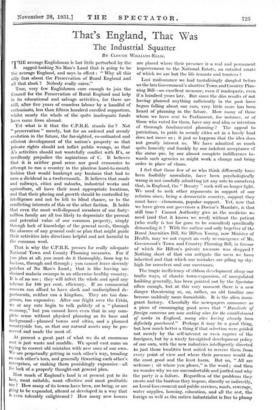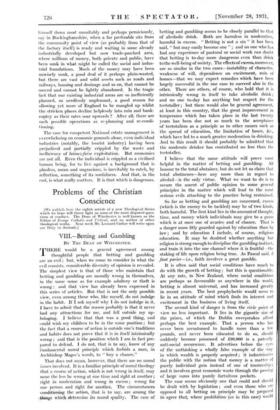That's England, That Was The Industrial Squatter BY CLOUGH WILLIAMS-ELL1S.
THE average Englishman is but little perturbed by the ragged-looking No Man's Land that is going to be the average England, and says in effect : " Why all this silly fuss about the Preservation of Rural England and all that slush ? Nobody really cares."
True, very few Englishmen care enough to join the Council for the Preservation of Rural England and help in its educational and salvage activities, for there are still, after five years of ceaseless labour by a handful of enthusiasts, less than fifteen hundred enrolled supporters, whilst nearly the whole of the quite inadequate funds have come from abroad.
Yet what is it that the C.P.R.E. stands for ? Not " preservation " merely, but for an ordered and seemly evolution in the future, the far-sighted, co-ordinated and efficient development of the nation's property so that private rights should not inflict, public wrongs, so that A's activities should not wastefully conflict with B's, or needlessly prejudice the aspirations of C. It believes that it is neither good sense nor good economics to attempt to run a country in the planless hand-to-mouth fashion that would bankrupt any business that had to earn a dividend in a twelvemonth. It believes that roads and railways, cities and suburbs, industrial works and agriculture, all have their most appropriate locations, and that their placing and growth should be controlled by intelligence and not be left to blind chance, or to the conflicting interests of this or the other faction. It holds that even, the most well-disposed members of our forty- million family are all too likely to depreciate the present and potential value of our common property, simply through lack of knowledge of the general needs, through the absence of any general code or plan that might guide their activities into directions helpful and not harmful to the common weal. .
That is why the C.P.R.E. presses for really adequate National Town and County Planning measures. For if you plan at all, you must do it thoroughly, from top to bottom, through and through ; you cannot leave slovenly patches of No Man's Land ; that is like leaving un- drained malaria swamps in an otherwise healthy country. It is of no use ; they will infect the whole and spoil any scheme for 100 per cent. efficiency. If no commercial concern can afford to have slack and undisciplined de- partments, neither can a kingdom. They are too dan- gerous, too expensive. After our fright over the Crisis, we at any rate begin to talk politely of a " planned economy," but you cannot have even that in any com- plete sense without physical planning as its base and background—planned towns and cities, and a planned countryside too, so that our natural assets may be pre- served and made the most of.
At present a great part of what we do at enormous cost is just waste and Muddle. We spend vast sums on trying to correct old mistakes with new ones of our own. We are perpetually getting in each other's way, treading on each other's toes, and generally thwarting each other's enterprises, or making them punishingly expensive—all for lack of a properly thought-out general plan.
How much of England's land is at present put to its best, most suitable, most effective and most profitable use ? How many of its towns have been, are being, or are going to be expanded, altered or developed in a way that is even tolerably enlightened ? How many new houses are placed where their presence is a real and permanent improvement to the National Estate, an entailed estate of which we are but the life tenants and trustees ?
Last midsummer we had tantalizingly dangled before us the late Government's abortive Town and Country Plan- ning Bill—an excellent measure, even if inadequate, even if a hundred years late. But since the dirt results of not having planned anything sufficiently in the past have begun falling about our ears, very little more has been heard of planning in the future. How many of those whom we have sent to Parliament, for instance, or of those who voted for them, have any real idea or intention of thorough fundamental planning ? The appeal to patriotism, to pride in seemly cities set in a lovely land does not move us ; it just so happens that the idea does not greatly interest us. We have admitted as much quite honestly and frankly by our indolent acceptance of the status quo, by our almost complete indifference to- wards such agencies as might work a change and bring order in place of chaos.
I feel that those few of us who think differently have been foolishly unrealistic, have been psychologically wrong in not candidly admitting (at any rate to ourselves) that, in England, the " Beauty " cock will no longer fight. We need to seek other arguments in support of our reforms since, being a democratic country, support they must have—clamorous, popular support. Yet, now that we have given our governors a Doctor's Mandate, is that still true ? Cannot Authority give us the medicine we need (and that it knows we need) without the patient (who really is too far gone to be consulted) specifically demanding it ? With the author and only begetter of the Rural Amenities Bill, Sir Hilton Young, now Minister of Health, may we not expect an early re-emergence of Mr. Greenwood's Town and Country Planning Bill, in favour of which Sir Hilton's private measure was dropped ? Nothing short of that can mitigate the mess we have inherited and that which our mistakes are piling up sky. high for ourselves and our successors.
The tragic inefficiency of ribbon development along our traffic ways, of chaotic town-expansion, of unregulated building generally, has been pointed out by the Spectator often enough, but at this very moment there is a new danger threatening us, or, rather, an old familiar one become suddenly more formidable. It is the alien immi- grant factory. Cheerfully the newspapers announce as a piece of encouraging good news that " Hundreds of foreign concerns are now seeking sites for the establishment of works in England, many sites having already been definitely purchased." Perhaps it may be a good thing, but how much better a thing if that selection were guided not merely by the self-interest or even caprice of the foreigner, but by a wisely far-sighted development policy of our own, with the new industries intelligently directed to .just those localities best suited, to receive them from every point of view and where their presence would do . the most good and the- least harm. But no, " All. are • welcome ; sit where you please," is the word ; and then we wonder why we are uncomfortable and jostled and why the party is a failure. Regardless of the problems they .create and the burdens they impose, directly or indirectly, .on Local Government and public services, roads, sewerage, • water supplies, housing, education, and all the rest, the foreign as well as the native industrialist is free to plump himself down most unsuitably and perhaps perniciously, say in Buckinghamshire, when a far preferable site from the community point of view (as probably from that of the factory itself) is ready and waiting in some already industrially developed but now trade-parched area, where millions of money, both private and public, have been sunk in what might be called the social and indus- trial foundations. Much of the money may have been unwisely sunk, a good deal of it perhaps plain-wasted, but there are vast and solid assets such as roads and railways, housing and drainage and so on, that cannot be moved and cannot be lightly abandoned. Is the tragic fact that our existing industrial areas are so inefficiently planned, so needlessly unpleasant, a good reason for allowing yet more of England to be mangled up whilst the stricken places decline helplessly into ruin and bank- ruptcy as their rates soar upwards ? After all, there are such possible operations as re-planning and re-condi- tioning.
The ease for competent National estate management is overwhelming on economic grounds alone, even individual industries (notably, the tourist industry) having been prejudiced and partially crippled by the waste and inefficiency of laissez-faire exploitation. But economics arc not all. Even the individual is crippled as a civilized human being, for to live against a background that is planless, mean and ungracious, is inevitably to catch, by reflection, something of its sordidness. And that, in the end, is what really matters. It is that which is dangerous.







































 Previous page
Previous page